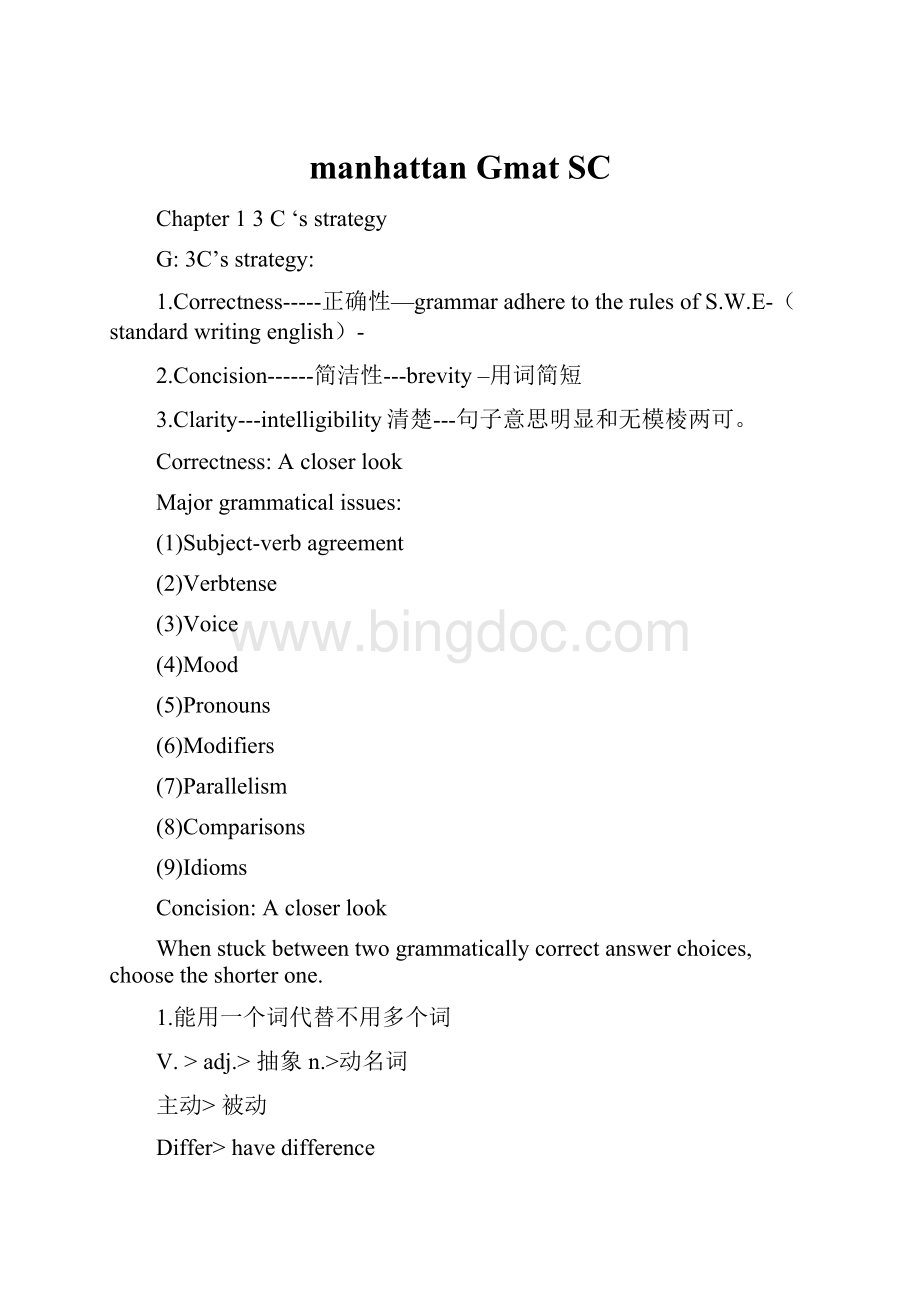manhattan Gmat SC.docx
《manhattan Gmat SC.docx》由会员分享,可在线阅读,更多相关《manhattan Gmat SC.docx(41页珍藏版)》请在冰点文库上搜索。

manhattanGmatSC
Chapter13C‘sstrategy
G:
3C’sstrategy:
1.Correctness-----正确性—grammaradheretotherulesofS.W.E-(standardwritingenglish)-
2.Concision------简洁性---brevity–用词简短
3.Clarity---intelligibility清楚---句子意思明显和无模棱两可。
Correctness:
Acloserlook
Majorgrammaticalissues:
(1)Subject-verbagreement
(2)Verbtense
(3)Voice
(4)Mood
(5)Pronouns
(6)Modifiers
(7)Parallelism
(8)Comparisons
(9)Idioms
Concision:
Acloserlook
Whenstuckbetweentwogrammaticallycorrectanswerchoices,choosetheshorterone.
1.能用一个词代替不用多个词
V.>adj.>抽象n.>动名词
主动>被动
Differ>havedifference
Idealize>ideal
Try>makeanattempt
2.Avoidredundancy---wordy
Canyoufindandlocatethewordsinthissentencethatareredundant?
用词重复:
---不简洁,不同的词表示同一意思
Being总是不简洁的信号---being必错
1.annualayear
2.raise,rise,increase,grow
3.around,orbit
4.bynameof;beknownas
5.with;included
6.attempttodo;trytodo
7.decline;down,fall,drop,decrease
8.rarely,ever
9.same,exact
10.sum,total
11.before和when不能连用在同一个句子中
12.academic与inschool不能在同一句中出现
13.possible,may
14.now和currently
12.
Clarity:
Acloserlook
通常原句子第一遍读应该是清晰的,选项把原文变得不清晰
如果选项改变了原文含义,这个选项不是正确答案。
改变原文含义的选项错在:
(1)wordplacement
(2)knownVS.unknown
(3)multiplemeanings
(4)“suchas”vs.“like”
----Clarityofmeaning:
wordplacement
变换一个词的位置会改变整个句子的含义。
(1)Only和all的修饰位置不能随意改变(原文修饰谁,选项应该还修饰谁)
(2)修饰词的位置不能随意改变
----Clarityofmeaning:
knowvs.unknown
Asentencethatexpressescertaintyaboutanoutcomeshouldnotbechangedtoexpressuncertaintyaboutthatoutcome(andviceversa反之亦然).
(1)原文和选项应该保持一致的态度:
P原文表达一个确定的结果-à选项也应该表达一个确定的结果
原文(certainoutcome)-à选项(certainoutcome)
P原文表达一个不确定或者可能的结果-à选项也应该表达一个不确定或者可能的结果
原文(uncertainoutcome)-à选项(uncertainoutcome)
P原文(假设)-à选项(假设)
P原文(事实)-à选项(事实)
P原文(asif/though)-à选项(asif/though)
O原文(asif/though)-à选项(没有asif/though)
O原文(certainoutcome)--à选项(uncertainoutcome)
O原文(假设)--à选项(事实)
(2)情态动词不能随意添加和改变
Must不能用should代替
Will不能用may代替
原文情态动词不能改变.
原文没有asif(though),选项不能有asif(though)
当不确定的情态动词出现在选项中,一定要检查原文是否有不确定地含义原文。
不确定的情态动词:
may,might,should,ought,would,can,could,asif
----Clarityofmeaning:
wordswithmultiplemeanings
避免使用含义很多的词light(轻,淡色)
如果一个词不能从原文中确定含义,那么选项中选择提供一个能确定固定含义。
----Clarityofmeaning:
“suchas”vs.”like”
Suchas,表示举例
Like,象,相似
表示举例用suchas不用like
Chapter2Subject-verbagreement主谓一致
Tofindthesimplesubject,eliminateanymodifiers—找到主语,去掉任何修饰语.
Gmat主谓一致是最主要的考点。
EliminatetheMiddleman
ThemostcommonwaytheGmatconfusesthenumberofthesubjectistosplitupthesubjectandtheverbbyinsertingaphraseinbetween,必须学会排除theinsertingphrase---themiddleman–sothatthetruesubjectbecomesclear.
Middleman:
(1)of
ifyoucanremoveaphrasefromthesentence,andthesentencestillmakesense,thephraseislikelya“middleman”
(2)andvs.additivephrase(附加短语)-----Anadditivephraseisjustanother“middleman”
Additivephrase不影响主语的数的变化不构成复合主语的词:
alongwith/inadditionto/aswellas/accompaniedby/togetherwith/including
@仅仅And变化谓语复数形式;单数主语和附属短语作主语不影响谓语的数的形式。
Remember:
onlythewordANDcanchangeasingularsubjectintoapluralone.Singularsubjectsfollowedbyadditivephrasesremainsingularsubjects.
(3)谓语动词随后的原则(与verb最近的主语保持人称和数的一致)
Either…or../neither...nor
CollectiveNounsaresingular集体名词作主语谓语动词用单数
Todeterminesubjectverbagreement,youmustfirstdecidewhetherthesubjectidsingularorplural.确定主谓一致,首先判断主语的单复数形式。
集体名词有:
administration,army,audience,class,crowd(一群,一伙),faculty(全体教员),orchestra,team,group.
ThecrowdIScheeringasthehometeamTakesthefield.
Indefinitepronouns:
UsuallySingular不定代词通常用单数
(1)以-one,-body,-thing结尾的代词作主语,谓语动词用单数
Singularpronouns
Anyone/anybody/anything/someone/somebody/something
Everyone/everybody/everythingnoone/nobody/nothing
Whatever/whoevereach/every
Either*/neither*
Either/neither当与or/nor成对出现的时候,可以使用复数的形式
(2)5个不定代词作主语,谓语的形式不确定—SANAM,由of的宾语决定主语的单复数形式。
S- some
A----any
N-----none
A------all
M-----most
TheSANAMpronounsaretheexceptiontothisrule:
youshouldlookattheobjectofthe“of”constructiontodeterminethenumberofthesubject.
SomeofthemoneyWASstolenfrommywallet.(money是单数)
SomeofdocumentsWEREstolenfromthebank.(documentsisplural)
(3)“Each“and”every”作主语:
谓语动词用单数
EverydogHASpaws.
Everydogandcathaspaws.
Eachoftheseshirtsispretty.
Theyeacharegreattennisplayer.(each是同位语)
NumericalWordsandPhrases数表示的词和短语
(1)Thenumberof-----+verb单数
Anumberof--------+verb复数
Othenumbersof
(2)Majority/minority/plurality(多数,较多数)作主语
—指整体动词用单数
----指整体的每一个个体,谓语动词用复数
ThemajorityofthestudentsinthisclassAREhardworkers.
Majorityof多数+复数名词+verb复数
单数名词+majority+verb单数
ThestudentmajorityISopposedtothedeathpenalty.
ASubjectphrase:
singularagain从句/短语作主语+谓语动词用单数
HavinggoodfriendsISawonderfulthing.
WhatevertheywanttodoISfinewithme.
WhenIndoubt,thinksingular,当主语分辨不清的时候,谓语动词多半用单数
Confusingsubjectsaremoreoftensingularthanplural,andthereforetheyusuallyrequiresingularverbforms.
总结:
谓语动词用复数的时候,主语有以下两种形式:
(1)And连接两个主语
(2)Anumberof+n
谓语动词用单数的时候,主语属于下列情况:
(1)单数名词+附属名词additive作主语----verb单数
=n1(单数)+additivephrase+n2+verb(单数)
6个Additivephrase---alongwith/inadditionto/aswellas/accompaniedby/togetherwith/including
(2)集体名词作主语-----verb单数
8个集体名词:
army/team/crowd/faculty/administration/class/audience/orchestra
(3)大部分非限定词(SANAM除外)作主语
(4)Each/every在短语前面合成作主语
(5)Thenumberof。
。
。
+verb单数
(6)分词短语和从句作主语---verb单数
Flipit---there在句首,句子倒装
thereISayoungmanandanolderwomanatthebusstop.
Flipit:
ayoungmanandanolderwomanareatthebusstop.
thereareayoungmanandanolderwomanatthebusstop
Chapter3Verbtense,mood,&voicestrategy
除了主谓一致外,动词还有3各方面需要考察:
时态tense,语气mood和语态voice。
Tense-------Verbtenseindicateswhenanactiontakesplace.
Mood-------TherearetwomoodsthataretestedontheGMAT:
indicative(陈述语气)andsubjunctive(虚拟语气).Verbsintheindicativemooddealwithrealevents.Verbsinthesubjunctivemooddealwitheventsthatarenotnecessarilytrue.陈述句的动词涉及真正的事件。
虚拟语气的动词处理没必要是真实的事件。
Voice----therearetwovoices:
activevoiceandpassivevoice.
Intheactivevoice,thesubjectofthesentenceperformstheaction---主语是动作的执行者。
Inpassivevoice----thesubjectofthesentencehasanactionperformedonitbysomeoneorsomethingelse.----主语是句子的承受者---其他人或事完成了主语的动作。
Infinitives----分开不定时的形式必错
避免在不定时形式to+do中的to和do动词之间插入词或者词组。
O主语+谓语+toquicklyrun…
P主语+谓语+torunquickly….
Thesimpletenses—一般时态和进行时态
----present(orpresentprogressive)
-----past(orpastprogressive)
----future(orfutureprogressive)
进行时态意味着在现在,过去或者将来正在进行的动作。
Keepitsimple----句子时态应该保持一致
Theperfecttenses:
anintroduction完成时态
Usethepresentperfecttenseforanactionthatbeganinthepastandcontinuesintothepresent.现在完成时,动作开始在过去持续到现在。
Somesentenceswithmorethanoneactiondorequireyoudoswitchverbtenseswithinasentence.Sometimesthisinvolvesasimpleandlogicalswitchbetweenthesimpletenses.
Forexample:
HeISthinnowbecauseheSPENTthelastsixmonthsonanintensivediet.
(thisisalogicalswitchgiventhecontentofthesentence)
Sometimes,however,actionsinasentenceinvolvemorecomplextimesequences.TheseactionscanbeexpressedusingthePERFECTtenses:
presentperfect&pastperfect.YoumustunderstandthesetodowellontheGMAT.
不使用完成时态的情况:
(1)Verbsthathavethesamegrammaticalsubject.—动词有同样的语法主语。
Becausethesequenceisclear.
Iwenttothestoreandboughtmilk.
(2)Before和after连接的从句,主句不使用完成时态。
因为时间先后顺序很清楚。
注意:
过去完成时态在GMAT中最为常见和最重要。
(3)当句子中只有一个动词的动作发生在过去---不能使用过去完成时态。
OIthinkthatancientpeoplesHADBELIEVEDinmanygods.
VIthinkthatancientpeoplesBELIEVEDinmanygods.
使用完成时态的情况:
(1)Ifanactionbeganinthepastandcontinuesintothepresent,usethepresentperfecttense.
(2)Ifanactionprecedesanearlierpastaction,usethepastperfecttense.
Otherwisesticktothesimpletense.
PastparticiplesofIrregularverbs:
Hang—悬挂hung,hung.Shehungthepicture./shehashungthepicture.
----绞死hanged,hanged.Theyhangedtheoutlaw./theyhashangedtheoutlaw.
Lay(toput放,放置,铺设,产蛋)—laid,laid
helaidtheplateonthetable./hehadlaidtheplateonthetable.
Lie(totellanuntruth)---lied,lied
Sheliedaboutherpast./shehasliedaboutherpast.
Lie(torecline)躺,保持,处于---laylain
Shelayonthebed./shehaslainonthebed.
If…thentenseconstruction---if….Then时态结构
Could/would不会出现在if的条件从句中,只会出现在then的从句中,有时候then从句省略then.
ifshecould/would
If...then(表示如果…那么…)条件从句指有下述三种形式:
(1)Present—ifshedoes….,(then)shewilldo….
Ifshewinsthelottery,shewillgivehalfthemoneytocharity.
(2)Past—ifshedid….,(then)shewould/coulddo…
Ifshewonthelottery,shewouldgivehalfthemoneytocharity.
(3)Pastperfect----ifshehaddone…,(then)shewouldhavedone…..
Ifshehadwonthelottery,shewouldhavegivenhalfthemoneytocharity.
当表示“是否”的时候whether>if
Thesubjunctivemood虚拟语气
InEnglish,wedonotoftenusethesubjunctive.mostsentencesarewrittenintheindicativemood,usedtoexpressfacts,ortheimperativemood祈使语气,usedtoexpresscommands.
虚拟语气在以下两种句型中出现:
(1)Ifclauses,whentheIFclauseexpressesaconditioncontrarytoreality.if从句表达与事实相反
IfIwerearichman…..,if表示虚拟语气
ifhewere…
ifhewas…
OifIwasrich,Iwoulddonatemoneytorebuildmyoldschool.
PifIwererich,Iwoulddonatemoneytorebuildmyoldschool.
Oifhewastall,hewouldbeabletoplaybasketballbetter.
Pifheweretall,hewouldbeabletoplaybasketballbetter.
(2)Hopes,proposals,desires,andreques